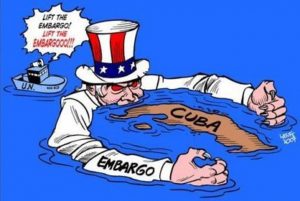Not Russia, China, North Korea, nor even for that matter Israel or Palestine, is able to focus the American mind the way Cuba does.
 Simultaneously, the official American right and the official American left (with a few honorable exceptions among the latter), have overcome the self-righteous character of their respective political discourses and — like secret lovers holding hands under the table — found a point of convergence that needs no explanation: the censuring of Cuba.
Simultaneously, the official American right and the official American left (with a few honorable exceptions among the latter), have overcome the self-righteous character of their respective political discourses and — like secret lovers holding hands under the table — found a point of convergence that needs no explanation: the censuring of Cuba.
This focusing of the American mind against Cuba is at least 60 years old, that is to say, as old as the Cuban revolution. This stance most recently appeared in the position assumed by the US Government, politicians in both parties, and mainstream media regarding the anti-government protests that broke out in Cuba a few weeks ago.
The first question we should ask ourselves is: how is it that so many of us so easily swallow the assumptions about Cuba presented to us by the official ideological narrative, and in doing so, censure our capacity to think and act critically? What is it about Cuba that makes so many of us succumb to the usual distributors of opinion that on other topics, we might question?
The sounds of silence
In contrast to the widespread anti-Cuban sentiment fanned by popular media and politicians on the left and right, no one in the US seems to notice the huge and mostly peaceful protests taking place in Colombia against state violence, poverty, inequality, lack of opportunity, and the discriminatory tax proposals of President Ivan Duque. (So far, 83 fatalities have been registered among the protesters and over 3,200 arbitrary detentions have been reported.)
Why are politicians and government officials ready to show indignation against Cuba, while remaining silent regarding the events in Colombia—or the similar protests that took place in Brazil, Peru and Ecuador? A caustic yet revelatory answer explaining the double standard of American foreign policy was provided by Franklin Delano Roosevelt in the 1930s, when, in defense of Nicaraguan dictator Anastasio Somoza, the American president candidly declared: “He may be a son of a bitch, but he is our son of a bitch.” Throughout US history, this favoritism for “our son of a bitch” endures.
All this effort to stifle one small country
Pointing to the existing double standard and hypocrisy of our politicians and the media is not enough to explain America’s over 60 years of political, economic and military animosity towards Cuba. The intention of this article is not to enumerate the long list of American aggressions against the small sovereign nation just 90 miles from Florida’s coast (more miles separate Olympia and Portland). It’s asking how to explain the multiple assassination attempts against Cuba’s political leaders, the use of chemical weapons to sabotage agricultural production, the direct military invasion of the Bay of Pigs, the permanent mediatic war of misinformation and interference (which is vigorously questioned in the US when the Russians do it to us), and the bombing of airplanes and ports. Not to mention what the current Cuban First Minister Diaz-Canel describes as the “cruel” and “genocidal” long lasting blockade designed to strangle the Cuban economy regardless of the cost in human suffering and endless violation of human rights?
All this effort to stifle one small country, in the middle of an era when—after the fall of the Soviet Union and the Berlin Wall—American capitalism boasts of being the triumphant subject and sole protagonist of human history
The root of the matter
What is it about Cuba that so threatens the US? What precisely about the small island must be repressed, regardless of the cost in human rights? The answer lies not in the economic resources of the island, nor in its strategic geographic location, nor in its military might, nor in any other traditional geo-political consideration.
Rather, the provocation that Cuba presents to the US is the evocative power of a rebellious imagination that reminds us that a better world is possible and that capitalism (under the US or any other power) is not the only conceivable way to achieve that world. It is the deep and urgent desire to eradicate this revolutionary possibility that provides the point of convergence, leading Republicans and most Democrats to amorous hand-holding under the table.
Conversely, it is exactly this liberatory evocation, albeit with human imperfections, made visible by the Cuban experience that has served, and continues to serve, as a source of inspiration for progressive and revolutionary movements in Latin America and other parts of the world. The recent victorious election of Left-Wing Trade Unionist Pedro Castillo as president of Peru constitutes the most recent example of this frame of mind in the Latin American political imagination. That is why Cuba is important. That is why Cuba is attacked, and why it must be defended.
Rum without Coke
While anti-government protests in Cuba have a material base in reality given the tough conditions of the economy, it would be wrong to attribute total responsibility for these conditions to the Cuban government. We can make that error only if we close our eyes to the long and present history of economic strangulation caused by the American embargo supported by Republican and Democrats.
The effects of the embargo have been amplified by the negative impact on the tourism industry caused by the Covid–19 pandemic and the collapse of oil supplies from Venezuela (also caused by direct and indirect US intervention in the international oil market). A UN resolution calling for an end to the Cuban embargo was adopted for the 29th time on June 23, 2021. 184 countries voted in favor of ending it, three abstained and just two voted to continue it: the US and Israel.
Cubans, as much as Americans, are entitled to self-determination, to forge their destiny with their own hands without foreign intervention of any kind. Isn’t that exactly what we hope and expect to occur in the US? Let Cubans decide if the rum they produce is to be mixed with the Coke we sell. So far, they clearly have mostly preferred rum without Coke. ¡Salud!
Enrique Quintero is a member of the Publishing Committee of Works in Progress.

Be First to Comment